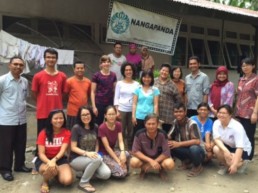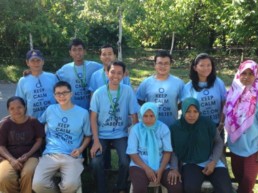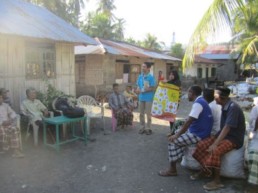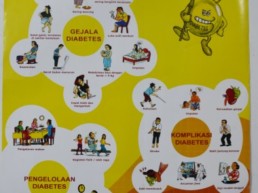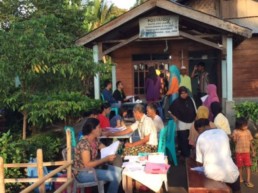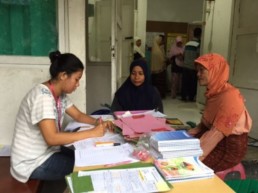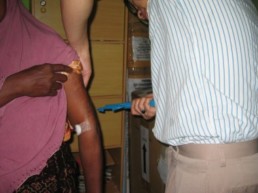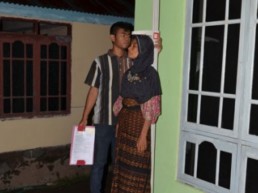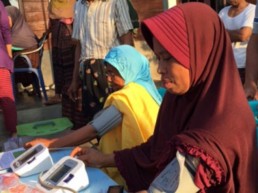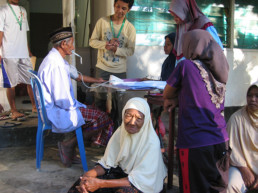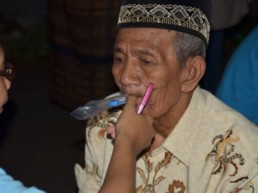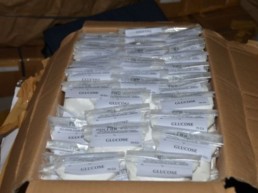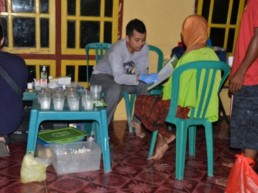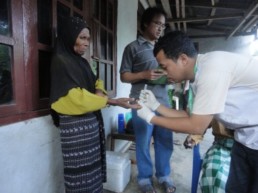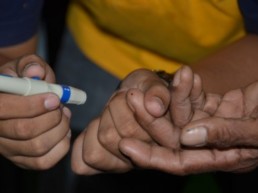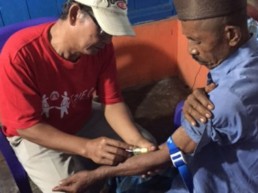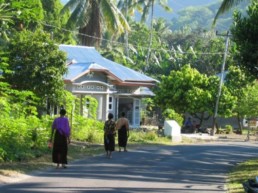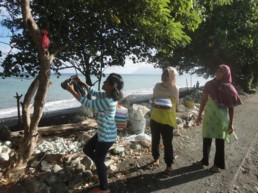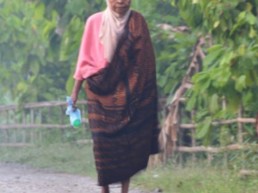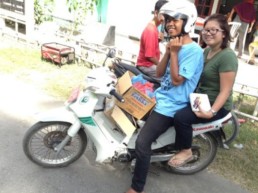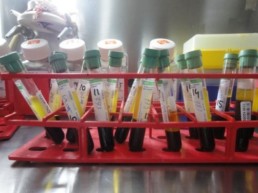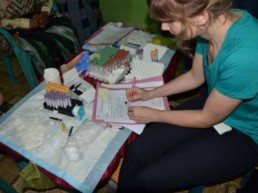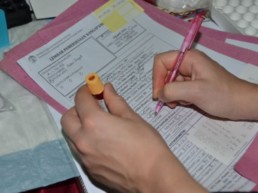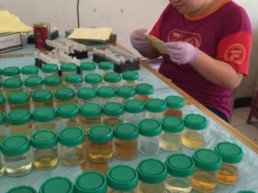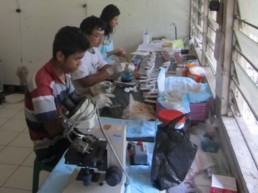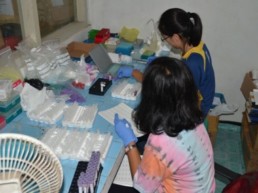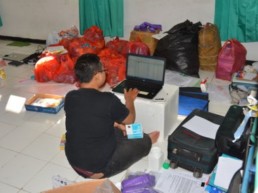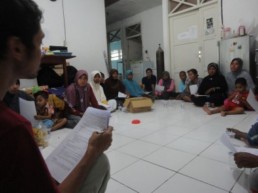Helminth infections and type 2 diabetes mellitus in Indonesia
Integrating parasitological, immunological, behavioral and metabolic studies (2012-2016)
Indonesia is a country in transition where environmental and lifestyle changes are altering the diseases landscape in the country, from infectious diseases to non-communicable inflammatory disorders, including type 2 diabetes mellitus (DM2). To get a grip on the precise mechanisms underlying this transition, this SPIN programme (Scientific Programme Indonesia – Netherlands) will take on the challenge of forming an interdisciplinary research to tackle:
- Type 2 diabetes
Mechanisms of insulin resistance risk factor for type 2 diabetes statistical models to understand complex interaction in type 2 diabetes.
Together the work will be centered around a population on Flores Island where chronic parasitic infections are endemic and where life style changes are taking place at a reasonably rapid pace. The hypothesis that helminth infections, which are associated with a strong modulation of immune responses towards a T-helper 2 and regulatory mode, are associated with increased insulin sensitivity and thus a healthy metabolic phenotype will be tested through a rigorous placebo controlled albendazole trial within households.
In addition, through questionnaires all lifestyle and behavioral data will be gathered in the Ende district. Translational studies will be performed in animal models to get insights into the mechanistic links between helminth infections and carbohydrate metabolism. The consortium is acutely aware of the urgent need for specialized statistical models to deal with complex datasets that will be generated and therefore takes the important step of creating a project dedicated to development of methods that can be utilized for the gathered information. The information is complex; it encompasses:
- Clinical data
- Biochemical data
- Molecular immunological descriptive details through questionnaires
Each of these have their own special characteristics in terms of distribution, cut off and missing values. By creating the methods to deal with the data, it will be possible to integrate all the data together and to create plausible biological pathways that lead to insulin resistance. Whenever possible, the program will be dedicated to providing tools for policy makers who need to allocate the precious resources to proper control of diseases in Indonesia.
SUGARSPIN PUBLICATION
- Kurniawan F, Tahapary DL, de Ruiter K et al. Effect of anthelmintic treatment on serum free IGF-1 and IGFBP-3: a cluster-randomized-controlled trial in Indonesia. Sci Rep 10, 19023 (2020). https://doi.org/10.1038/s41598-020-75781-4
- de Ruiter K, van Staveren S, Hilvering B, Knol E, Vrisekoop N, Koenderman L, Yazdanbakhsh M. A field-applicable method for flow cytometric analysis of granulocyte activation: Cryopreservation of fixed granulocytes. Cytometry A. 2018 Mar 13. doi: 10.1002/cyto.a.23354.
- Tahapary DL, de Ruiter K, Kurniawan F, Djuardi, Wang Y, Nurdin SME, Iskandar E, Minggu D, Yunir E, Guigas B, Supali T, Rensen PCN, Sartono E, Soewondo P, Harbuwono DS, Smit JWA & Yazdanbakhsh M. Impact of rural-urban environment on metabolic profile and response to a 5-day high-fat diet. Scientific Reportsvolume 8, Article number: 8149 (2018). doi: 10.1038/s41598-018-25092-6
- Tahapary DL, de Ruiter K, Martin I, Brienen EAT, van Lieshout L, Djuardi Y, Djimandjaja CC, Houwing-Duistermaat JJ, Soewondo P, Sartono E, Supali T, Smit JWA, Yazdanbakhsh M. Effect of anthelmintic treatment on leptin, adiponectin and leptin to adiponectin ratio: a randomized-controlled trial. Nutr Diabetes. 2017 Oct 16;7(10):e289. doi: 10.1038/nutd.2017.37.
- Kaisar MM, Brienen EA, Djuardi Y, Sartono E, Yazdanbakhsh M, Verweij JJ, Supali T, va n Lieshout L. Improved diagnosis of Trichuris trichiura by using a bead-beating procedure on ethanol preserved stool samples prior to DNA isolation and the performance of multiplex real-time PCR for intestinal parasites. Parasitology. 2017 Mar 14:1-10. doi: 10.1017/S0031182017000129. [Epub ahead of print]
- de Ruiter K, Tahapary DL, Sartono E, Soewondo P, Supali T, Smit JW, Yazdanbakhsh M. Helminths, hygiene hypothesis and type 2 diabetes. Parasite Immunol. 2016 Dec 7. doi: 10.1111/pim.12404.
- Hussaarts L, García-Tardón N, van Beek L, Heemskerk MM, Haeberlein S, van der Zon GC, Ozir-Fazalalikhan A, Berbée JF, Willems van Dijk K, van Harmelen V, Yazdanbakhsh M, Guigas B. Chronic helminth infection and helminth-derived egg antigens promote adipose tissue M2 macrophages and improve insulin sensitivity in obese mice. FASEB J. 2015 Jul;29(7):3027-39. doi: 10.1096/fj.14-266239. Epub 2015 Apr 7.
- Dicky L Tahapary, Karin de Ruiter, Ivonne Martin, Lisette van Lieshout, Bruno Guigas, Pradana Soewondo, Yenny Djuardi, Aprilianto E Wiria, Oleg A Mayboroda, Jeanine J Houwing-Duistermaat, Hengki Tasman, Erliyani Sartono, Maria Yazdanbakhsh, Johannes W A Smit and Taniawati Supali. Study protocol. Helminth infections and type 2 diabetes: a cluster-randomized placebo controlled SUGARSPIN trial in Nangapanda, Flores, Indonesia. BMC Infectious Diseases (2015) 15:133 DOI 10.1186/s12879-015-0873-
SCIENTIFIC BACKGROUND OF THE PROJECT
- Hamid F, Wiria AE, Wammes LJ, Kaisar MM, Djuardi Y, Versteeg SA, Wahyuni S, van Ree R, Sartono E, Supali T, Yazdanbakhsh M. Risk Factors Associated with the Development of Atopic Sensitization in Indonesia. PLoS One. 2013 Jun 19;8(6):e67064.
- Kaisar MM, Supali T, Wiria AE, Hamid F, Wammes LJ, Sartono E, Luty AJ, Brienen EA, Yazdanbakhsh M, Lieshout LV, Verweij JJ. Epidemiology of Plasmodium infections in Flores Island, Indonesia using real-time PCR. Malar J. 2013 May 24;12(1):169.
- Wiria AE, Hamid F, Wammes LJ, Kaisar MM, May L, Prasetyani MA, Wahyuni S, Djuardi Y, Ariawan I, Wibowo H, Lell B, Sauerwein R, Brice GT, Sutanto I, van Lieshout L, de Craen AJ, van Ree R, Verweij JJ, Tsonaka R, Houwing-Duistermaat JJ, Luty AJ, Sartono E, Supali T, Yazdanbakhsh M. The effect of three-monthly albendazole treatment on malarial parasitemia and allergy: a household-based cluster-randomized, double-blind, placebo-controlled trial. PLoS One. 2013;8(3):e57899.
- Wammes LJ, Wiria AE, Toenhake CG, Hamid F, Liu KY, Suryani H, Kaisar MM, Verweij JJ, Sartono E, Supali T, Smits HH, Luty AJ, Yazdanbakhsh M. Asymptomatic plasmodial infection is associated with increased tumor necrosis factor receptor II-expressing regulatory T cells and suppressed type 2 immune responses. J Infect Dis. 2013 May 15;207(10):1590-9.
- Wammes LJ, Wiria AE, Toenhake CG, Hamid F, Liu KY, Suryani H, Kaisar MM, Verweij JJ, Sartono E, Supali T, Smits HH, Luty AJ, Yazdanbakhsh M. Asymptomatic plasmodial infection is associated with increased tumor necrosis factor receptor II-expressing regulatory T cells and suppressed type 2 immune responses. J Infect Dis. 2013 May 15;207(10):1590-9.
- Wammes LJ, Hamid F, Wiria AE, Wibowo H, Sartono E, Maizels RM, Smits HH, Supali T, Yazdanbakhsh M. Regulatory T cells in human lymphatic filariasis: stronger functional activity in microfilaremics. PLoS Negl Trop Dis. 2012;6(5):e1655.
- Pasha SM, Wiria AE, Wammes LJ, Smit JW, Partono F, Supali T, Yazdanbakhsh M, Tamsma JT. Blood pressure class and carotid artery intima-media thickness in a population at the secondary epidemiological transition. J Hypertens. 2011 Nov;29(11):2194-200.
- Djuardi Y, Wammes LJ, Supali T, Sartono E, Yazdanbakhsh M. Immunological footprint: the development of a child’s immune system in environments rich in microorganisms and parasites. Parasitology. 2011 Oct;138(12):1508-18.
- Supali T, Verweij JJ, Wiria AE, Djuardi Y, Hamid F, Kaisar MM, Wammes LJ, van Lieshout L, Luty AJ, Sartono E, Yazdanbakhsh M. Polyparasitism and its impact on the immune system. Int J Parasitol. 2010 Aug 15;40(10):1171-6.
- Firdaus H, Wiria AE, Wammes LJ, Kaisar MM, Lell B, Ariawan I, Uh HW, Wibowo H, Djuardi Y, Wahyuni S, Schot R, Verweij JJ, van Ree R, May L, Sartono E, Yazdanbakhsh M, Supali T. A longitudinal study of allergy and intestinal helminth infections in semi urban and rural areas of Flores, Indonesia (ImmunoSPIN Study). BMC Infectious Diseases 2011, 11:83
- Wiria AE, Prasetyani MA, Hamid F, Wammes LJ, Lell B, Ariawan I, Uh HW, Wibowo H, Djuardi Y, Wahyuni S, Sutanto I, May L, Luty AJ, Verweij JJ, Sartono E, Yazdanbakhsh M, Supali T. Does treatment of intestinal helminth infections influence malaria? Background and methodology of a longitudinal study of clinical, parasitological and immunological parameters in Nangapanda, Flores, Indonesia (ImmunoSPIN Study) BMC Infect Dis. 2010 Mar 25;10:77.
- Wammes LJ, Hamid F, Wiria AE, de Gier B, Sartono E, Maizels RM, Luty AJ, Fillié Y, Brice GT, Supali T, Smits HH, Yazdanbakhsh M. Regulatory T cells in human geohelminth infection suppress immune responses to BCG and Plasmodium falciparum. Eur J Immunol. 2010 Feb;40(2):437-42.

Radboud University Nijmegen Medical Centre
Chair Department of Medicine
PO Box 9101
6500 HB Nijmegen
The Netherlands
Tel.: +31 24 36 1476
Prof. J.W.A. Smit
Principal coordinator in the Netherlands
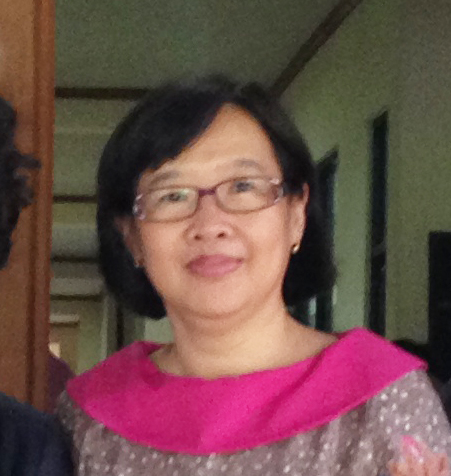
University of Indonesia
Department of Parasitology
Faculty of Medicine
Jl. Salemba Raya 6, 10430 Jakarta
Indonesia
Tel: +62-21-3914607
Prof. T. Supali
Principal coordinator in Indonesia

Leiden University Medical Center
Department of Parasitology
Albinusdreef 2
2333 ZA Leiden
The Netherlands
Tel: +31 71 5265067
Prof. M. Yazdanbakhsh
Scientific Coordinator
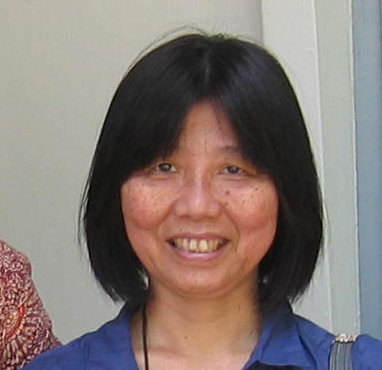
Leiden University Medical Center
Department of Parasitology
Albinusdreef 2
2333 ZA Leiden
The Netherlands
Tel: +31 71 5265072
Dr. E. Sartono
Scientific Project Manager

Leiden University Medical Center
Department of Public Health and Primary Care
Albinusdreef 2
2333 ZA Leiden
The Netherlands
Tel: +31 71 52698402
Prof. R. Reis

Leiden University Medical Center
Medical Statistics and Bioinformatics
Albinusdreef 2
2333 ZA Leiden
The Netherlands
Tel: +31 71 5269707
Prof. J.J. Houwing-Duistermaat
 Leiden University Medical Center
Leiden University Medical Center
Center for Proteomics and Metabolomics
Einthovenweg 20
2333 ZC Leiden
The Netherlands
Tel: +31 71 5266395
Dr. Oleg A. Mayboroda
The human immune system is continuously exposed to infectious micro organisms and noxious as well as innocuous substances in the environment. Depending on the genetic makeup, the innate and adaptive immune responses develop and determine the frequency and the course of infectious diseases. It is becoming increasingly clear that certain pathogens causing chronic infections, such as parasitic helminths, have strong immunomodulatory activities affecting responses to co-infections. In many parts of the developing world, malarial and helminth infections are co-endemic and many children are infected by both parasites. We intend to investigate the immunological associations between helminth infections and malarial parasites in coendemic areas of Indonesia to answer the question whether helminths by increasing suppressory immune responses increase susceptibility to malarial parasites on the one hand but protect from cerebral malaria on the other. This central question cannot be addressed in isolation. The immune response is affected by environmental exposure to pollutants and to endotoxin, which are inflammatory triggers. The rural Indonesian household is highly dependent on biomass fuels and associated with relatively poor hygiene; these translate into high exposure to pollutants and endotoxin. It is important to measure how these environments affect the immune system and its interaction with infectious microbes; an area that has not been addressed in developing countries before. Finally, the genetic makeup of an individual plays a key role in how immune responses develop.
We will address the question of how the household environment and host genetics shape the course of helminth/malaria co-infections. We will build into the program a secondary question of how the genetic makeup, environmental exposure and parasitic infections affect inflammatory disorders such as allergic diseases. It is important to realise that Indonesia is a country in transition from one with high burden of infection and traditional lifestyle to one where infectious diseases will be controlled and modern lifestyle will take over bringing along an increase in inflammatory diseases such as allergies and autoimmune diseases. We are therefore keen to build a network program that addresses specific questions on infectious diseases of importance now and inflammatory diseases that are expected to become important in the future, with the view to finding intervention strategies.

Flores Island

Flores Island
A Collaborative network of 3 Universities in the Netherlands and 2 Universities in Indonesia will bring together experts who will set up multidisciplinary field studies in Flores Island, where semi urban village Nangapanda and rural area of Anaranda will form the bases for epidemiological surveys. These areas are endemic for malarial parasites and helminth infections and provide the unique opportunity of studying the interaction between these infections within distinct environmental contexts in terms of a rural to urban gradient. The Geographical Positioning and Information System (GPS/GIS) will form an integral part of the data collection allowing entry of spatial, demographic, environmental and clinical data. This will allow the generation of maps as part of the multivariate analysis of data to reveal trends, dependencies and inter relationships that otherwise remain hidden in tabular data. The epidemiological surveys will be linked to basic studies in immunology, biochemistry and genetics to understand the molecular mechanisms behind interactions found at the epidemiological level.
To this end, immunological micro assays that have been developed for population studies will be applied to gain insight into the innate and adaptive immune system while detailed genomic/proteomic studies of T cell subsets and antigen presenting cells will be performed in subsets of the study population. Indoor environmental samples collected from representative houses will be assessed for their content of carbon pollutants and microbial products using (bio)chemical assays. In vitro models will be set up to verify the specific interactions between immune cells and the environmental factors and to understand the mechanisms downstream of these interactions. For genetic studies, samples will be collected and polymorphisms analysed in family based studies as well as case control designs. Candidate genes involved in control of infections, allergies, pro and anti inflammatory immune responses will be targeted.
The data generated will be analysed within the following conceptual framework to determine multiple relationships among several related and unrelated variables:

Developing countries need to incorporate science, technology and innovation into their economy. It is the mandate of SPIN program to facilitate this process and the current proposal has been developed as a result of equal partnership between Indonesian and Dutch scientists who propose to carry out joint projects of highest scientific quality in the area of health. By generating a pool of young scientists with complementary skills that follow 9 PhD tracks, the program will build capacity for the future.

